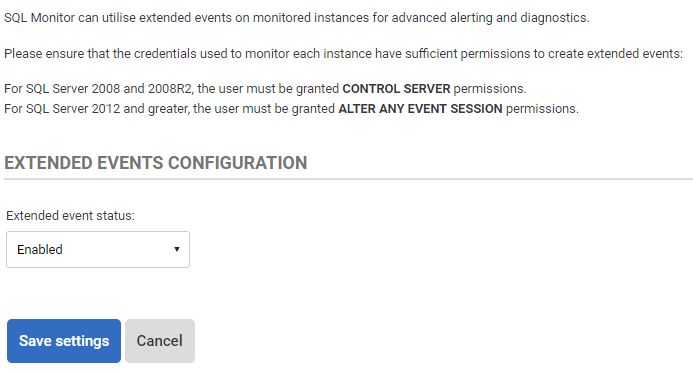Extended Events
Published 13 September 2017
About SQL Monitor's support for extended events
In order to provide richer and more accurate information, SQL Monitor now support extended events
Currently the beta is limited to using extended events for better deadlock alerting, but in the future, support for additional events will be added.
Requirements for Extended Events
Extended events are only supported on monitored instances with version SQL 2008 and greater.
Please ensure that the credentials used to monitor each instance have sufficient permissions to create extended events:
- For SQL Server 2008 and 2008R2, the user must be granted CONTROL SERVER permissions.
- For SQL Server 2012 and greater, the user must be granted ALTER ANY EVENT SESSION permissions
Configuring Extended Events
Go to the Configuration tab under Monitoring, select Extended Events:
Enabling extended event sessions on all monitored SQL instances
- Change the "Extended event status" to "Enabled"
- Click "Save settings"
- So long as the credentials used to monitor the instances have the appropriate permissions, an extended event session will be created on each instance
Disabling extended event sessions on all monitored SQL instances
- Change the "Extended event status" to "Disabled"
- Click "Save settings"
- So long as the credentials used to monitor the instances have the appropriate permissions, any extended event sessions created by SQL Monitor will be stopped and removed
Using Extended Events
Deadlock alerts
The existing deadlock alert (which is raised by turning on the trace flag 1222 and retrieving the deadlock from the error log file) will be replaced by a new deadlock alert.
Clicking on an instance of this deadlock alert now shows a visualization of the deadlock, which can be interacted with to better understand the causes of the deadlock:






